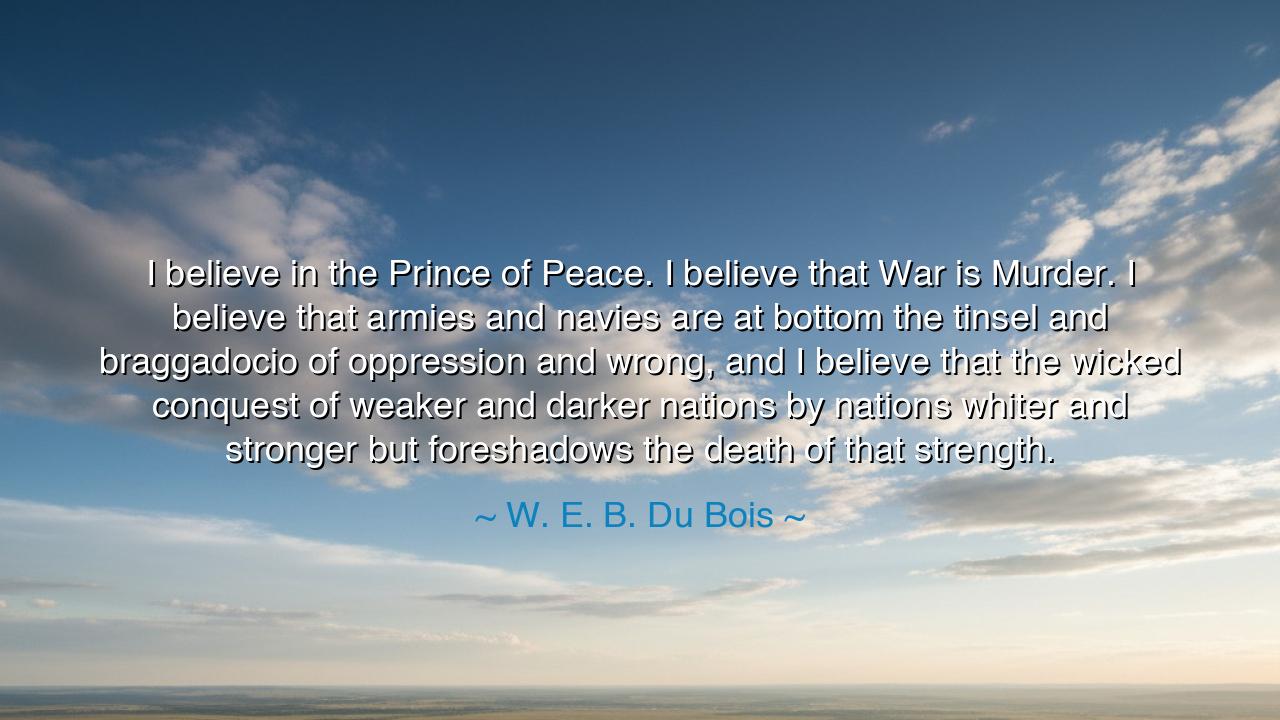
I believe in the Prince of Peace. I believe that War is Murder. I
I believe in the Prince of Peace. I believe that War is Murder. I believe that armies and navies are at bottom the tinsel and braggadocio of oppression and wrong, and I believe that the wicked conquest of weaker and darker nations by nations whiter and stronger but foreshadows the death of that strength.






“I believe in the Prince of Peace. I believe that War is Murder. I believe that armies and navies are at bottom the tinsel and braggadocio of oppression and wrong, and I believe that the wicked conquest of weaker and darker nations by nations whiter and stronger but foreshadows the death of that strength.” – W. E. B. Du Bois
There are voices in history that do not merely speak—they thunder with moral fire. Among them was W. E. B. Du Bois, the prophet of justice and conscience of a wounded age. When he declared his faith in the Prince of Peace, he did not whisper soft words of piety; he spoke a declaration of rebellion against the empire of cruelty. His was a cry for peace that was not passive, and a condemnation of war that was not timid. He looked upon the gleaming uniforms, the drums and flags of conquest, and saw not glory—but murder, adorned in the trappings of honor. To him, the armies and navies that strutted before the world were not symbols of safety, but of oppression and wrong, gilded with vanity and sustained by pride.
Du Bois lived in an age when the great powers of the world—the empires of Europe and the rising might of America—spread their dominion across Africa and Asia under the banner of “civilization.” They called it progress, but it was tyranny draped in white linen. They spoke of enlightenment, yet they brought chains and fire. Du Bois, seeing the plunder of weaker and darker nations, warned that such injustice carried within it a poison—a death of strength, slow but certain. For no empire built on cruelty can stand forever. The blood it spills will one day stain its own flag.
To understand the depth of these words, we must remember the fall of Rome. Once the mightiest empire upon earth, it conquered nations in the name of order, yet devoured itself from within. It glorified war, and in that worship of violence, it forgot its soul. What Du Bois spoke was the same ancient truth that doomed Rome: when power feeds upon oppression, it sows the seeds of its own decay. For true strength lies not in the sword, but in justice, mercy, and the dignity of peace.
And when Du Bois named the Prince of Peace, he spoke not merely of the Christ of churches, but of the eternal principle that stands above all kings—the divine law that love is stronger than hate, that peace is mightier than conquest. In his time, the world had already suffered through the Great War, a slaughter so vast that it dimmed the stars of reason. Yet still, nations rearmed, and drums beat again for empire. Against this madness, Du Bois stood as a seer among blind men, declaring that war is not noble—it is the death of the soul disguised as patriotism.
Consider the tale of Mahatma Gandhi, the frail man who faced the British Empire not with bullets, but with truth. He too believed in the Prince of Peace. He too looked upon armies and saw not protection, but vanity and fear. With no sword, he broke the chains of millions; with no army, he brought a nation to freedom. In him, Du Bois’s vision found living proof—that peace, when wielded by the courageous, is not weakness but the highest form of power.
O children of the future, hear this warning: beware the glitter of conquest, for it blinds the eyes of nations. Beware the pride of strength, for it decays into arrogance. The world may still dress its wars in the language of virtue, calling them “defense,” “order,” or “progress.” But the wise heart knows that wherever one man tramples another, oppression has already begun its march toward ruin. Let your courage be born not of hatred, but of compassion; your strength, not from domination, but from understanding.
The lesson is eternal: that peace is not the absence of struggle, but the victory of conscience over cruelty. To follow the Prince of Peace is to build, not destroy—to heal, not wound. In your life, let your power serve justice. Refuse to glorify violence, whether in nations or in hearts. Remember that every act of mercy is a blow against tyranny, every word of truth a weapon sharper than the sword. For the empires of the proud will crumble into dust, but the kingdom of peace endures forever, written not in conquest, but in compassion.






AAdministratorAdministrator
Welcome, honored guests. Please leave a comment, we will respond soon